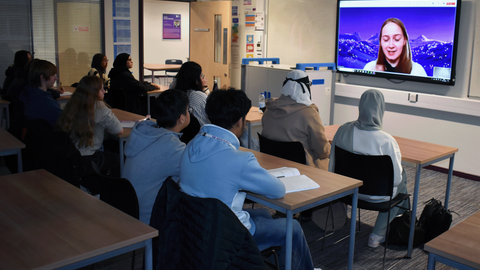Course overview
The qualification studied is Level 3 Applied Diploma in Criminology which is equivalent to one A level
Criminology is a modern and innovative course which looks at crime from the perspective of both criminals and victims. The subject teaches a critical analysis of the criminal justice system, whilst also examining the motives of criminals. This course is especially appealing to those who wish to pursue a career in forensics or criminal psychology.
Entry requirements
Students studying three A Levels will be expected to have a minimum of two GCSEs at grade 6 and three GCSEs at grade 5/4, including English Language and Mathematics at grade 5/4 or above. Or eight GCSEs at a minimum of grade 5. This course may be taken alongside A Level courses and may be more suited to learners with a strong profile of prior attainment in vocational studies.
Topics you will study
Topics studied include:
Unit 1: Changing awareness of crime.
Students will learn about a variety of crimes that are under-reported and have a low level of public awareness. Students will learn how we record crime and whether it is an accurate system. There have been many campaigns that have changed the law and students will have the opportunity to explore them and the changes they have brought. The learning in this unit concludes with students planning and designing their own campaign for change.
Unit 2: Criminological theories.
In this unit, students will apply their understanding of the public awareness of the public perceptions of crime studied in Unit 1, with Criminological theories to examine how both are used to set policy. Students will consider why people commit crime and whether these theories are credible. The theories will then be applied to real-life situations, and this will allow students to discover answers to questions such as 'what makes someone a serial killer?'.
Unit 3: Crime Scene to Court Room.
In this unit, students will develop the understanding and skills needed to examine information in order to review the justice of verdicts in criminal cases. Students will follow a crime from the initial crime scene to the investigation by the police and other personnel involved in criminal investigations. Students will also discover some of the techniques used by the police and forensic investigators and will follow the criminal justice process through the various stages- right through to the trial process.
Unit 4: Crime and Punishment.
In this unit, students will develop the skills in order to evaluate the effectiveness of the process of social control in delivering policy in practice. There is a focus on agencies in the criminal justice system, such as the police, Crown Prosecution Service, Probation and Prisons. Students will discover the way our laws are made as well as studying the methods used by society to bring about social control.
Key features
The course is focused on assessing biological, individualistic and sociological theories of crime. Units include: changing awareness of crime, criminological theories, crime scene to court room and crime and punishment.
Assessment
Unit 1: Year 1 – Internal summative controlled assessment
Unit 2: Year 1 – External examination of short and extended questions
Unit 3: Year 2 – Internal summative controlled assessment. Learners produce a piece of evidence that contributes to the assessment criteria
Unit 4: Year 2 – External examination of short and extended questions
Exam Board: WJEC
Enrichment and Work Experience
Students are expected to complete a one-week work experience placement in the Summer term. Work experience is a vital part of a young person’s learning experience. It supports the academic skills they develop during their time at The Sixth Form and allows them to acquire skills that cannot be taught in the classroom. Responsibility for obtaining this placement lies ultimately with the learner, although there is vast amount of support and guidance available to assist them, with the help of our work experience officer, the careers team, curriculum teachers and their personal tutor.
Why choose B6?
This is a dynamic and stimulating subject, offering students an experience of learning about crime. You will develop your knowledge and the wider issues surrounding crime; from examining the minds of criminals to legal proceedings in the courtroom.
Future career opportunities
This qualification will allow you to gain the required knowledge and skills to be able to consider employment within a range of aspects of the criminal justice system, law or the police including the courts, national probation service and tribunal’s service or the national offender management service.
Additional information
Criminology is useful for learners considering a career in the field of crime, legal system, or forensic science. Learners must have a keen interest in current affairs related to deviant and criminal behaviour. Following the news is essential to keep abreast with both reported and under-reported crime. Recommended textbooks:
WJEC Level 3 Applied Certificate and Diploma Criminology by Carole A Henderson
Criminology Book One by Robert Webb.
Lucy Glover
Studying:
A Level Law and Psychology and Vocational A Level Criminology
Previous school:
Fred Longworth High School
Related Courses
News
Religious Studies Students Explore the Women of the Bible
Having the opportunity to participate in a bespoke Religious Studies Club, A-level Religion, Ethics
B6 Alumni Member, Claire Taylor, Inspires EPQ Students
Former Sixth Form Bolton student, Claire Taylor, joined us from her studies at University of Bath
Art Students stun with end of year showcase
Early last week, Level 3 Art & Design students from The Sixth Form Bolton proudly showcased their









